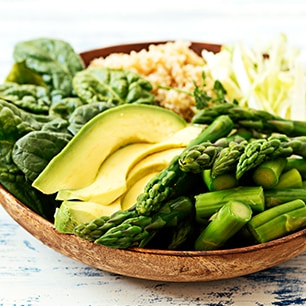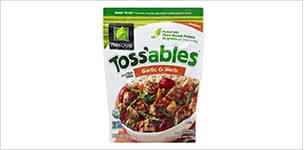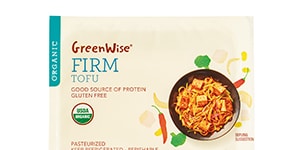May 20, 2021
Just about everywhere you look, plant-based foods are part of the culinary landscape—and with good reason. Plant-based eating offers many potential health benefits and robust meal options that taste great!
According to a 2021 Consumer Viewpoints and Purchasing Behaviors survey by the International Food Information Council Foundation, 65% of respondents said they'd tried a new plant protein over the past 12 months.1 Whether you enjoy the occasional meatless meal or you’re a plant-based regular, we have product and recipe inspiration along with shopping and planning strategies.

Why eat plant-based?
Adding plant-based foods to your routine may help you achieve a variety of wellness goals. Here are four reasons why people choose to eat more plants:
- Plant-based eating patterns may help lower the risk of developing type 2 diabetes, especially when the diet includes fruits, vegetables, whole grains, legumes, and nuts.2
- Plant-based diets may help you lose weight. Both vegetarian and Mediterranean eating styles have shown effectiveness in reducing body weight, body mass index, and fat mass.3
- Plant-based eating is associated with a lower risk of cardiovascular diseases.4
- The Academy of Nutrition and Dietetics, the American Heart Association, and the 2015–2020 Dietary Guidelines for Americans recommend well-planned vegetarian diets for improved health.
Keep in mind that you don’t have to eat a plants-only diet to enjoy some of these benefits. Taking small steps to introduce more plants to your meals can help too. No matter how you define plant-based eating, the main focus is to include more foods from plant sources such as fruits, vegetables, whole grains, nuts and seeds, oils, and legumes and beans.
Shopping for plant-based foods.
Find plentiful plant-based options in our stores for various dietary needs and preferences. Here’s what to look for in each department as you shop. Pick up new recipes and products along the way.
Plant-based dairy alternatives.
- If you’re avoiding dairy, we offer several plant-based milk alternatives such as almondmilk. Look for unsweetened varieties to avoid added sugar.
- Oatmilk is creamy and delicious in smoothies, soups, and baked goods. Plus, it’s nut-free for those with allergies.
- Milk alternatives do not have the same nutrition profile as cow’s milk. So be sure to choose varieties that are fortified with calcium and vitamin D. Because they have less protein, it’s important to get your protein from other sources. Reference our plant-based protein primer.
- We also have yogurt alternatives made from plant-based milks such as almondmilk or coconut milk. Check the labels to find plant-based yogurts with less saturated fat and added sugar.
- Plant-based snacking is easy with cream cheese options. Serve with baby carrots, sliced bell peppers, celery, or any of your favorite cut veggies.
Plant-based frozen foods.
- Frozen fruit is a go-to for smoothies and bowls.
- Frozen vegetables are convenient and easy to prepare. Look for options without sauce or those seasoned with herbs and spices for less sodium and saturated fat.
- Don’t forget frozen spiralized and riced veggies. They’re perfect if you’re watching carbs or avoiding gluten! Try them in our recipes for Lentil Bolognese over Zoodles and Tangled Beet Salad.
- Keep your eyes peeled for plant-based entrées, pizzas, and patties—including organic and gluten-free varieties. Our Better Choice shelf tags can help you identify the ones with less sodium and saturated fat.
- Pick up frozen plant-based burritos, such as our GreenWise Vegetable Burrito.
- GreenWise organic frozen quinoa and vegetable blends are great meal or side options.
- Treat yourself to Publix Premium plant-based ice cream alternatives. Be mindful of your portion size.
Plant-based cheese and meat alternatives.
The abundance of fresh fruits and vegetables in our Produce department serves as a cornerstone for plant-based eating. But you can find several other plant-based foods here:
- Discover our selection of dairy-free cheeses and meat alternatives. Compare labels and look for options with less sodium and saturated fat.
- Browse our traditional meatless proteins such as tofu and tempeh. GreenWise organic tofu is great for soups, smoothies, stir-fries, and more.
- Flavored tofu crumbles cut down on meal prep time.
- Try new meat alternatives such as jackfruit, which is also gluten free.
- Pick up some vegetarian burgers—perfect for the grill.
- We have plant-based protein covered, with plant-based burgers, patties, and ground beef crumbles.
More plant-based grocery options.
- Look for whole grain sides such as brown rice and quinoa. Microwaveable pouches and cups make them easy to prepare.
- Grab an assortment of canned beans—kidney, black, pinto, cannellini, chickpeas, and more—to have on hand for meals and recipes. Our GreenWise low sodium beans make great options. You can also rinse beans to reduce your sodium intake.
- Lentils are excellent sources of protein and fiber and satisfying additions to plant-based diets. Make a meal of flavorful GreenWise Spiced Lentil Stew, which meets our Better Choice recipe criteria.
- Bean- and legume-based pastas are higher in protein and fiber than traditional ones. Substitute them in your favorite pasta dishes.
A day of plant-based eating.
As you prepare for your next shopping trip, consider these plant-based meal ideas that cover an entire day.
Breakfast: Start with a hearty, delicious Tofu Scramble. Pair it with a small fruit salad.
Lunch: Heat up a GreenWise Organic Vegetable Burrito to enjoy with a guacamole cup and baby carrots.
Snack: Grab some apple slices and dip them in GreenWise peanut, almond, or cashew butter.
Dinner: Prepare our hearty GreenWise Spiced Lentil Stew, which features vegetarian sausage, lentils, kale, celery, carrots, onions, and spices.
For the love of you.
Choosing how you eat is uniquely personal. It’s about your needs, your preferences, and your goals. As your wellness ally, we're in your corner with fresh ideas, recipes, and wellness icons that make it easier to shift toward wiser food choices. It’s all about you, at your very best.
Sources
1 Consumer Viewpoints and Purchasing Behaviors Regarding Plant and Animal Protein Survey. International Food Information Council (IFIC) Foundation. January 26, 2021.
2 Quian, F., F. B. Hu, S. N. Bhupathiraju, and Q. Sun. Association Between Plant-Based Dietary Patterns and Risk of Type 2 Diabetes: A Systematic Review and Meta-analysis. JAMA Internal Medicine 179, no. 10 (July 22, 2019): 1335–44.
3 Sofi, F., M. Dinu, G. Pagliai, F. Cesari, A. M. Gori, A. Sereni, M. Becatti, et al. Low-Calorie Vegetarian Versus Mediterranean Diets for Reducing Body Weight and Improving Cardiovascular Risk Profile: CARDIVEG Study (Cardiovascular Prevention with Vegetarian Diet). Circulation 137, no. 11 (March 13, 2018): 1103–13.
4 Satija, Ambika, and Frank B. Hu. Plant-Based Diets and Cardiovascular Health. Trends in Cardiovascular Medicine 28, no. 7 (October 2018): 437–41.

 You are about to leave publix.com and enter the Instacart site that they operate and control. Publix’s delivery and curbside pickup item prices are higher than item prices in physical store locations. Prices are based on data collected in store and are subject to delays and errors. Fees, tips & taxes may apply. Subject to terms & availability. Publix Liquors orders cannot be combined with grocery delivery. Drink Responsibly. Be 21. For prescription delivery, log in to your pharmacy account by using the Publix Pharmacy app or visiting
You are about to leave publix.com and enter the Instacart site that they operate and control. Publix’s delivery and curbside pickup item prices are higher than item prices in physical store locations. Prices are based on data collected in store and are subject to delays and errors. Fees, tips & taxes may apply. Subject to terms & availability. Publix Liquors orders cannot be combined with grocery delivery. Drink Responsibly. Be 21. For prescription delivery, log in to your pharmacy account by using the Publix Pharmacy app or visiting 

